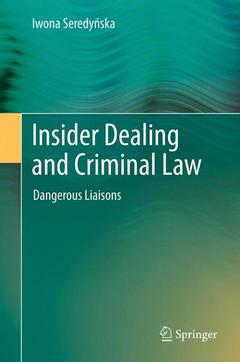Description
Insider Dealing and Criminal Law, 2012
Dangerous Liaisons
Author: Seredyńska Iwona
Language: English
Subject for Insider Dealing and Criminal Law:
Insider Dealing and Criminal Law
Publication date: 01-2014
278 p. · 15.5x23.5 cm · Paperback
Publication date: 01-2014
278 p. · 15.5x23.5 cm · Paperback
Insider dealing and criminal law: dangerous liaisons (hardback)
Publication date: 11-2011
278 p. · 15.5x23.5 cm · Hardback
Publication date: 11-2011
278 p. · 15.5x23.5 cm · Hardback
Description
/li>Contents
/li>Comment
/li>
This work is a multidisciplinary analysis of the issue of insider dealing from the perspective of the applicability of criminal law to regulate it. First, it examines the nature of its prohibition in the European Union and in the United States of America. The text includes a more extensive overview of prohibition in four Member States of the European Union (France, the United Kingdom, Luxembourg and Poland). Then, it summarises the arguments presented by ethicists and economists in favour of and against insider dealing. Further, it analyses the foundations of criminal law and justifications that are given for its application. On the basis of this analysis, it presents a new two-step theory of criminalisation. The first step is based on a liberal theory of wrongfulness that makes reference to protection of the basic human rights. The second step relies on classical but often forgotten principles of criminal law. Finally, it examines possible alternatives to criminal rules.
Introduction.- Insider dealing prohibition – basic construction, economic and ethical perspectives.- Practical issues arising from the transposition of the Market Abuse Directive into the chosen Member States’ legal systems.- Principles-based application of the criminal law.- Alternative models of regulation of insider dealing.- Conclusions.
Two-step theory of criminalisation offers a new approach for application of criminal law The two-step criminalisation schema may be used in order to examine any proposition of a new criminal regulation as well as to evaluate already existing laws Analysis of insider dealing from the perspective of principles of criminal law Comparative study of insider dealing prohibition and case-law in four EU Member States Comparison of European and American insider dealing regulation
© 2024 LAVOISIER S.A.S.




